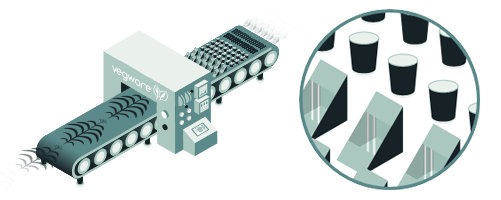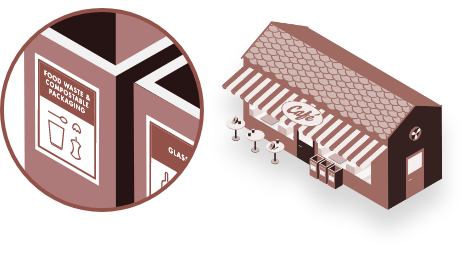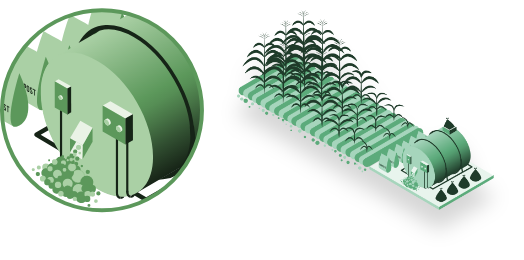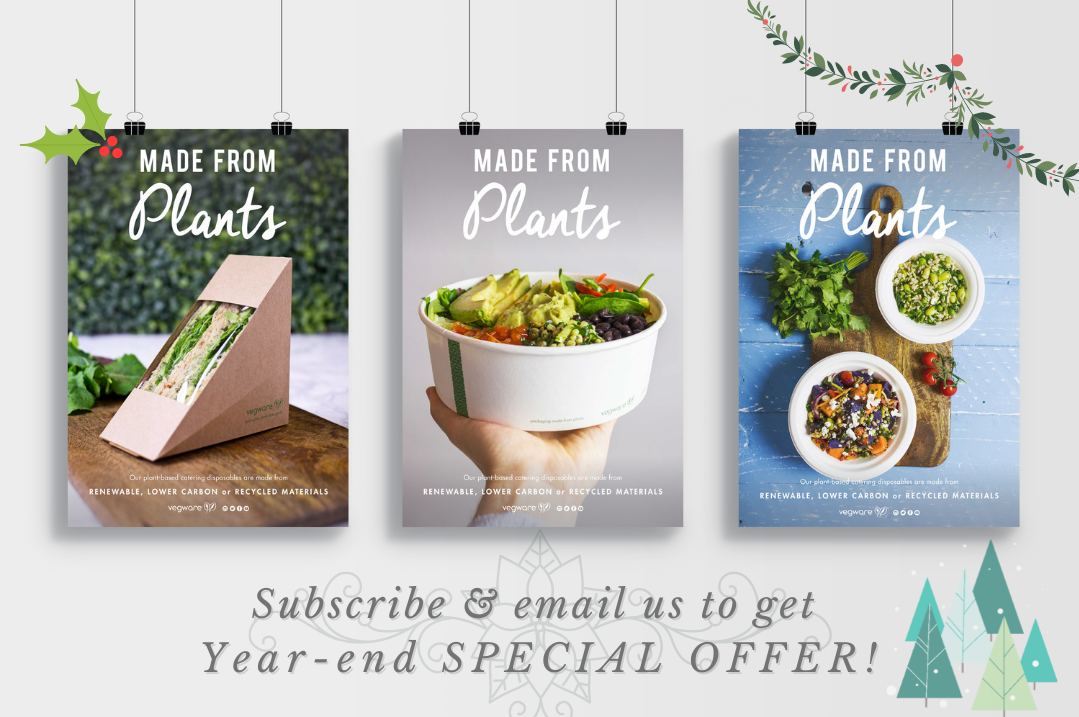Manufacturing the world's best eco products since 2006
Vegware is a visionary brand, the global specialist in plant-based compostable foodservice packaging. Our products are made from plants using renewable, lower carbon, recycled or reclaimed materials, and known for their quality and performance. We work with the world’s largest contract caterers and distributors, and are chosen by large corporate offices, government buildings, healthcare facilities, academic institutions, tourist attractions, food retailers and event organizers. You'll also see Vegware at countless artisan delis and independent cafés.
Vegware's composting solutions
Waste activism is at the heart of Vegware's award-winning environmental services.
Since 2012, our Environmental team have been forging links with the waste sector, identifying new routes to commercial composting and running large-scale trials at industrial composting facilities. We can advise on your composting options, from trade waste collections to on-site composting. No site is too big or too small for us to explore the possibilities. And we encourage customers who compost to offer bring-back schemes so you can capture used Vegware takeaways for composting. Learn more so you can Compost Your Vegware!

Packaging made from plants
Our plant-based compostable foodservice packaging is made from renewable, lower carbon, recycled or reclaimed materials. In its finished form, Vegware can be commercially composted with food scraps, where accepted. We hold the sector's most extensive set of compostability certification, which is an independent guarantee our products can be processed in the correct facilities.
Visual cues
Visual cues like bin signage and posters designed by Vegware helps everyone on your site know which bin to put waste in. Compostable disposables are designed to be recycled in an industrial composting facility together with food scraps. That means there’s no need for sorting, and the compostable cup, lid, burger box, knife and napkin can all go together without removing the ketchup and leftover french fries. An extra bonus is that once food and disposables share one bin, other dry recycling bins are cleaner and easier to recycle.


Collection
Vegware can consult on your region’s composting collection options. Compostables are still relative newcomers compared to other materials, so trade collections aren’t yet available everywhere, but we are actively changing this through our partnerships with the waste sector. If there's no collection in your region, the sustainability benefits of using renewable materials, instead of finite oil-based resources, still apply.
Composting
Officially defined as a form of recycling, composting keeps resources in your region without relying on export. Your waste is turned into useful resources, helping your business to reduce its environmental impact and join the circular economy. Compost is used in agriculture, horticulture, and landscaping to nourish soil and improve its structure to help grow healthy plants.

Commercial composting explained
Commercial, also known as industrial, composting facilities are where used Vegware can go to be processed together with food scraps. There are facilities throughout the US, and worldwide, processing used Vegware.
Open windrow & In-vessel composting (IVC) are the main processes suited to composting our products, as well as some Anaerobic digestion (AD) plants with a composting phase.
Open windrow
Open windrow is an industrial composting method where compostable matter lies in long piles exposed to air rather than being processed in an enclosed vessel. It is the most common composting process in the US and can successfully compost all of Vegware’s products.

In-vessel composting (IVC)
In-vessel composting is an ideal process for used Vegware products. This method mixes green waste with food scraps and compostable packaging in a fully enclosed vessel. Heat is generated naturally, allowing the material to break down to produce compost free of any harmful bacteria. This compost can then be used as a high quality soil conditioner.

Anaerobic digestion (AD)
Anaerobic digestion converts organic waste into renewable biogas and digestate, a natural fertiliser, in a managed process that is oxygen-free. Some forms of AD can process Vegware, such as the wet-AD, where compostable packaging enters a de-packager that applies high pressure and added waste water. Packaging is separated out from the organic waste and sent for a cold wash and final screening to remove organic residue. It is then sent to an IVC to turn to compost.
On-site composting
Food scraps and Vegware products are gathered, shredded and de-watered together in a macerator. It's then combined with other green waste, plus wood chips, within the composter. In as little as 14 days, you have high-quality mulch to use on-site.If your organization has large volumes of catering waste, some space, and a use for compost, investing in an on-site composting unit can be an exciting and sustainable solution. It requires an initial investment, plus maintenance costs and a staff to manage it, but in time you can vastly reduce waste collections and produce your own soil improver. Our Environmental team can advise you on the on-site composters that work best with our products.
Watch on-site composting in action
See how an on-site composter allowed Vegware client Dundee and Angus College to take control of food waste, reduce packaging in canteens, and move away from conventional plastics.Let us answer your questions on composting
- What's the point of disposables being compostable?
Compostable catering disposables are designed to be recycled in an industrial composting facility together with food scraps. This means there’s no need for sorting, so the compostable cup, lid, burger box, knife, and napkin can all go together without removing the half-eaten sandwich, ketchup or leftover french fries. An added bonus is that once food and disposables share one bin, other dry recycling bins are cleaner and easier to recycle.
Compostability isn’t best for all situations. For example, Vegware wouldn’t make compostable water bottles, as PET plastic already has a developed recycling infrastructure. But when it comes to food-contaminated disposables, compostability is a sensible solution.即棄環保餐具與食品包裝用品可堆肥對環境有什麼意義?
Vegware可堆肥即棄餐具及食品包裝用品由植物製造,旨在與食物廚餘一起在工業堆肥設施中回收,經過特定處理後變成營養豐富的堆肥物料。這意味著客人無需進行分類或清洗,可以將可堆肥的杯子、蓋子、漢堡盒、刀和餐巾與食物廚餘都放在一起,而無需取出或清理吃了一半的三明治、番茄醬或剩餘的炸薯條。另一個好處是,一旦食物和即棄餐具及食品包裝共用一個廚餘回收箱,其他回收箱就會更乾淨、更容易回收,亦可以減少用水清洗的步驟,節省水資源。
不過,可堆肥產品並不適合所有情況。例如,Vegware 不會生產可堆肥水瓶,因為 PET 塑膠已經擁有發達的回收基礎設施。但對於受食物污染的即棄餐具及食品包裝用品,可堆肥性是個明智的解決方案。
- How do compostables solve food scrap contamination?
Combining plastic and paper products in foodservice packaging creates big recycling problems. Food scrap contamination is inevitable, so the result is everything that is not sorted correctly will end up going to incineration or landfill.
可堆肥如何解決食物殘渣污染?
在食品服務包裝中將塑膠和紙製品結合起來會產生很大的回收問題。食物廚餘污染是不可避免的,因此結果是所有未正確分類的東西最終都會被焚燒或運到堆填區掩埋。
- What’s wrong with recyclable?
The US used to export most of its plastic for recycling, with no idea of knowing if it actually got recycled. China took a lot of exported recycling from the US, but over the years discovered it isn’t good enough quality or clean enough to recycle. Since January 2018, China has banned imports of household plastics, and only accepts cardboard and paper with less than 0.5% contamination. Other Asian countries are considering, and implementing, similar bans, to avoid becoming a dumping ground for unrecyclable waste. Food scrap contamination is a major problem, and the US recycling industry worries that most US card and paper won’t meet China’s standards.
可回收有什麼問題嗎?
美國過去常常出口大部分塑膠進行回收,但不知道它們是否真的被回收了。中國從美國進口了大量回收材料,但多年來發現這些材料的品質或清潔程度不夠好,無法回收。自2018年1月起,中國禁止進口家用塑料,只接受污染低於0.5%的紙板和紙張。其他亞洲國家正在考慮並實施類似的禁令,以避免成為不可回收廢物的傾倒場。食物廚餘污染是一個主要問題,美國回收業擔心大多數美國卡片和紙張不符合中國的標準。
- Where is it easiest to capture used compostables?
Vegware’s close ties to the waste sector means we are able to help identify composting solutions for many of our clients – from contract caterers operating on-site dining for large corporate office buildings, hotels, universities, and more – to independent cafes and those holding events such as large-scale festivals or sports venues. Vegware staff has good tips to set up programs in many different kinds of food service operations.
哪裡最容易回收用過的Vegware產品?
Vegware 與廢棄物回收產業的公司及機構有密切聯繫,意味著我們能夠幫助許多客戶確定回收解決方案: 從為大型企業辦公大樓、飯店、大學等提供現場餐飲的合約餐飲服務商 , 到獨立咖啡館和舉辦活動的客戶,例如大型節慶或體育場地。 Vegware 團隊在許多不同類型的食品服務,提供很好的回收方案。
- What about packaging for to-go orders?
Compostables face the exact same issue as all disposables with to-go orders: How to capture it once it’s walked out the door. All disposables are fighting the same challenges, with the same end goal: Better recycling.
Vegware encourages sites that are commercially composting their used Vegware to offer a bring-back scheme to entice customers to return their used Vegware to-go containers. This can operate as a loyalty card scheme, with customers earning a point or stamp towards a free drink or other treat, for each item returned.
Where composting is not yet an option, remember that Vegware to-go packaging is still made from renewable, plant-based resources, and given the opportunity, can be composted in commercial composting facilities. When it comes to foodservice, conventional plastics are a challenge to recycle due to both our recycling infrastructure and because food residues contaminate plastic packaging causing it to be unrecyclable.外賣訂單的包裝怎麼樣?
環保可堆肥餐具與所有帶有外賣訂單的即棄餐具及包裝面臨著完全相同的問題:一經使用後,如何捕獲它回收處理。所有即棄餐具都在應對相同的挑戰,並具有相同的最終目標:更好的回收。
Vegware 鼓勵對用過的 Vegware 產品進行商業堆肥,我們提供回收計劃,以吸引顧客歸還他們用過的 Vegware 外賣容器。這可以作為忠誠卡計劃運作,顧客每退回一件商品就可以賺取積分或印章來獲得免費飲料或其他款待。
在仍無法選擇堆肥的情況下,請記住,Vegware外賣包裝仍然由可再生可持續的植物性材料製成,如果有機會,可以在商業堆肥設施中進行堆肥。在餐飲服務方面,我們可提供可回收Vegware產品的廚餘回收公司及機構資訊,讓餐廳可以將Vegware環保餐具與廚餘一同回收,經過特定處理後變成營養豐富的堆肥物料,支持可循環經濟。
- How can Vegware help clients find composting solutions?
Our unprecedented engagement with the waste sector means Vegware is uniquely placed to help our clients realize their waste ambitions. Composting collections are still regional rather than nationwide, but we proud to be actively driving change. Vegware has composting partners in many US cities.
Our US Zero Waste Director is an expert on routes to commercial composting – she can consult on your various options:
COMPOSTING REGIONS. Vegware works with the waste sector to actively grow trade waste collection routes. We currently cover select areas in the north, south, east, or west.
ON-SITE COMPOSTERS. If your business has outdoor space, a use for compost, and staff to manage it, investing in an on-site composter can be an exciting and sustainable solution, as seen in this film of Dundee & Angus College. Our Environmental team can advise which models work with our products.
Vegware has the most robust list of composter partners in the sector – become a Vegware customer and we will share our knowledge!Vegware 如何幫助顧客找到堆肥解決方案?
我們對廢棄物處理領域的前所未有的參與意味著 Vegware 具有獨特的優勢,可以幫助我們的客戶實現他們的廢棄物處理的熱誠。堆肥收集仍然是區域性的,而不是全國性的,但我們很自豪能夠積極推動變革。 Vegware 在美國許多城市都有堆肥合作夥伴。
我們的美國零廢棄物總監是商業堆肥途徑的專家 - 她可以就您的各種選擇提供諮詢:
堆肥區域。 Vegware 與廢棄物部門合作,積極發展貿易廢棄物收集路線。我們目前涵蓋北部、南部、東部或西部的部分地區。
現場堆肥機。如果您的企業擁有戶外空間、堆肥用途以及管理堆肥的員工,那麼投資現場堆肥機可能是一個令人興奮且可持續的解決方案,正如鄧迪與安格斯學院的這部影片所示。我們的環境團隊可以建議哪些型號適用於我們的產品。
Vegware 擁有該領域最強大的堆肥合作夥伴名單 - 成為 Vegware 客戶,我們將分享我們的知識!
- What is Vegware made from?
Vegware packaging is made from plants using renewable, recycled or reclaimed materials, and are all designed for industrial composting with food waste. Vegware replaces conventional plastics with various plant-based materials. For example, PLA is a compostable material made from plants. PLA replaces the conventional plastic in coffee cup linings or sandwich windows, and it’s the clear material in our cold cups and deli containers. Our hot cup lids and cutlery are made of a high-heat version of PLA.
Reclaimed sugarcane fiber is another practical material we use for our takeout containers, plates, and bowls. Known as bagasse, it performs very well, keeping heat in while not trapping condensation. Plus, it’s a renewable material and a reclaimed by-product of the sugar industry.
Read more about our eco materials and compostability certification.Vegware 是由什麼製成的?
Vegware環保餐具及食品包裝由使用可持續、回收或再生材料的植物製成,並且全部設計用於食物垃圾的工業堆肥。 Vegware 以各種植物材料取代了傳統塑膠。例如,PLA 是一種由植物製成的可堆肥材料。 PLA 取代了咖啡杯塗層或三明治窗中的傳統塑膠,並且是我們的凍飲杯和熟食容器中的透明材料。我們的熱杯蓋和餐具由耐高溫的 PLA 製成。
回收甘蔗纖維是我們用來製作外賣容器、盤子和碗的另一種實用材料。它被稱為甘蔗渣,性能非常好,可以保持熱量,同時不會產生冷凝。另外,它是一種可再生材料,也是製糖業的回收副產品。
- Do plant-based materials work as well as plastic?
Absolutely. We’ve won awards for our product quality and functionality, in addition to being recognized for our environmentally friendly products and services.
植物材質的效果和塑膠一樣好嗎?
絕對的。除了我們的環保產品和服務得到認可外,我們還因其優秀產品品質和功能而獲獎。
- What’s the difference between biodegradable and compostable?
Same process, different breakdown speeds. Forget the term biodegradable, as it tells us nothing about timelines (wood is biodegradable, but a log cabin can stand for generations). Compostable means something can break down in under 12 weeks and is therefore suitable for industrial composting. Make sure your disposables supplier or brand has compostability certifications like BPI and CMA – that’s the real guarantee.
可生物降解和可堆肥有什麼不同?
相同的過程,不同的分解速度。忘記「可生物降解」這個詞,因為它沒有告訴我們任何時間線(木材是可生物降解的,但小木屋可以世代相傳)。可堆肥意味著某些東西可以在 12 週內分解,因此適合工業堆肥。確保您的即棄餐具供應商或品牌擁有 BPI 和 CMA 等可堆肥性認證 - 這才是真正可堆肥的保證。
- What are composting conditions?
Compostable packaging needs to be in composting conditions in order to compost. Industrial composting creates the perfect balance of microbes, moisture and warmth heat, so that compostable packaging can be included in food waste recycling. Home composting conditions vary with the skill of the householder, so we don’t make any claims there, but there have been successful trials using hot compost bins. The heat generated during composting is a function of the compost pile’s size. A small pile will typically not generate enough heat to break down packaging. Industrial facilities have very large piles.
堆肥的條件是什麼?
可堆肥餐具及食品包裝需要在特定堆肥條件下才能變成堆肥物料。工業堆肥創造了微生物、水分和熱量的完美平衡,使可堆肥包裝可以納入食物廢棄物回收。家庭堆肥條件因戶主的技能而異,因此我們對此不做任何聲明,但已經有使用熱堆肥箱的成功試驗。堆肥過程中產生的熱能是堆肥堆大小的函數。一小堆通常不會產生足夠的熱能量來分解包裝。工業設施有非常完善的方式令Vegware產品得到最好的降解處理,變成營養豐富的堆肥物料。
- What’s the point if I can’t compost it?
By choosing compostables, foodservice businesses can actively drive changes in US recycling. The more compostables there are in use, the more we can work with the waste sector to extend collections across the USA.
如果我不能堆肥它有什麼意義?
透過選擇可堆肥材料的環保餐具及食品包裝用品,餐飲服務企業可以積極推動美國回收的變革。使用的堆肥材料越多,我們就越能與廢棄物部門合作,將收集範圍擴大到美國各地。
- Which bin should it go in if I can’t compost it?
Vegware’s compostable catering disposables are designed to break down in under 12 weeks in commercial composting, which provides the perfect balance of microbes, moisture and warmth.
Home composting conditions vary with the skill of the householder, so we don’t make any claims there, but there have been successful trials using hot compost bins. Where there is no access to industrial composting facilities, used Vegware should be put in general waste. Vegware’s disposable packaging is made from plants, using renewable, reclaimed or recycled materials, and these sustainability benefits still apply no matter what happens to them after use.
Used Vegware should not be placed in standard recycling bins which collect paper, plastics and metals, as those materials go to a different type of sorting facility. Another reason is that food waste harms the quality of mechanical recycling – the same applies to any used foodservice disposables.
In landfill, studies have shown that compostable packaging is inert and does not give off methane.
Please do not litter – compostable packaging is not expected to break down when discarded in the environment and is also not a solution to marine pollution.如果我不能堆肥它應該放入哪個垃圾箱?
Vegware 的可堆肥環保餐具及食品包裝用品設計,可在商業回收及堆肥處理中在 12 週內分解,實現微生物、濕度和溫暖的完美平衡。
家庭堆肥條件因戶主的技術而異,因此我們對此不做任何聲明,但已經有使用熱堆肥箱的成功試驗。如果沒有工業堆肥設施,用過的Vegware產品應放入一般廢棄物中。 Vegware 的環保餐具包裝由植物製成,使用可持續、回收或再生材料,無論使用後發生什麼情況,這些永續性優勢仍然適用。
用過的Vegware不應放入收集紙張、塑膠和金屬的標準回收箱中,因為這些材料會被送往不同類型的分類設施。另一個原因是食物垃圾會損害機械回收的品質——這也適用於任何用過的餐飲即棄餐具及用品。
研究顯示,在垃圾堆填區,可堆肥包裝是惰性的,不會釋放甲烷。
請不要亂丟垃圾-可堆肥包裝在開放環境中是不會自行分解或自然降解成堆肥料,也無法解決海洋垃圾污染。
- Is Vegware suitable for on-site composting?
Where collections aren’t possible, some on-site composting systems can process used Vegware with food waste. At Dundee and Angus College, for example, the compost produced on site is used in the College gardens by horticulture students – f ind out more in this short film case study. If your site has some outside space and would be interested in discussing options, just get in touch.
Vegware 適合現場堆肥嗎?
在無法收集的地方,一些現場堆肥系統可以將用過的Vegware產品與食物廢棄物及廚餘一起處理。例如,在鄧迪和安格斯學院,園藝專業的學生將現場生產的堆肥用於學院花園——在這部短片案例研究中了解更多。如果您的場所有一些外部空間並且有興趣討論廢物處理選項,請與我們聯繫。
- Why is education so important?
We’ve had in-house recycling experts for five years now, working closely with the waste sector and helping our foodservice clients set up composting schemes. A key part of the switch-over is education and behavior change, creating clear bin signage and training everyone involved – from customers and catering managers to restaurant staff and waste operatives. The last thing we want is to send contaminated waste to composting facilities. So, education is very important, and it’s something we take seriously here at Vegware.
為什麼教育如此重要?
我們設立的內部回收專家部門已經有五年了,與廢棄物處理部門密切合作,幫助我們的餐飲服務客戶制定回收堆肥計畫。轉變的關鍵部分是教育和行為改變,創建清晰的垃圾箱標誌並培訓所有相關人員——從顧客和餐飲經理到餐廳工作人員和廢物處理人員。我們最不想看到的就是將受污染的廢棄物送到堆肥設施。因此,教育非常重要,也是我們 Vegware 認真對待的事情。
- If plastics are easily recycled, shouldn’t I just use plastic packaging?
The reality is that when it comes to foodservice, conventional plastic can’t be recycled easily. Foodservice packaging made from conventional oil-based plastics – once used and permanently marked with food and drink residue – are a massive recycling challenge. Instead, composting is a local form of recycling, boosting local economies and supplying nutrient-rich compost for use in agriculture, horticulture, and landscaping.
Compostables are the only practical solution for food-contaminated disposables. The more businesses that go compostable, the faster we can achieve this much-needed change.
Interested in learning more about how to compost your used Vegware? Contact our Environmental team to find the best solution for your business. We offer Vegware clients expert support, every step of the way to zero waste. Email info@vegware.hk.如果塑膠很容易回收,我不是應該只使用塑膠包裝嗎?
現實情況是,在餐飲服務方面,已使用或已被食物污染的傳統塑膠不容易回收。由傳統油基塑膠製成的餐飲包裝,一旦使用並永久標記有食品和飲料殘留物,將是一項巨大的回收挑戰。相反,植物纖維製成的餐具可以回收處理,變成堆肥物料是一種新型回收形式,可以促進當地經濟並提供營養豐富的堆肥用於農業、園藝和景觀美化。
隨著社會對塑膠餐具的關注,可堆肥餐具是處理受食品污染的即棄餐具及包裝用品唯一實用的解決方案。使用可堆肥環保餐具的企業越多,我們就能越快實現減廢零廢物的社會變革,實現永續循環經濟。
有興趣了解更多有關如何回收處理使用過的Vegware環保餐具及外賣包裝的資訊嗎?請聯絡我們的團隊,為您的企業找到最佳解決方案。我們為 Vegware 客戶提供專家支持,全程協助實現零浪費。電子郵件 info@vegware.hk.。


